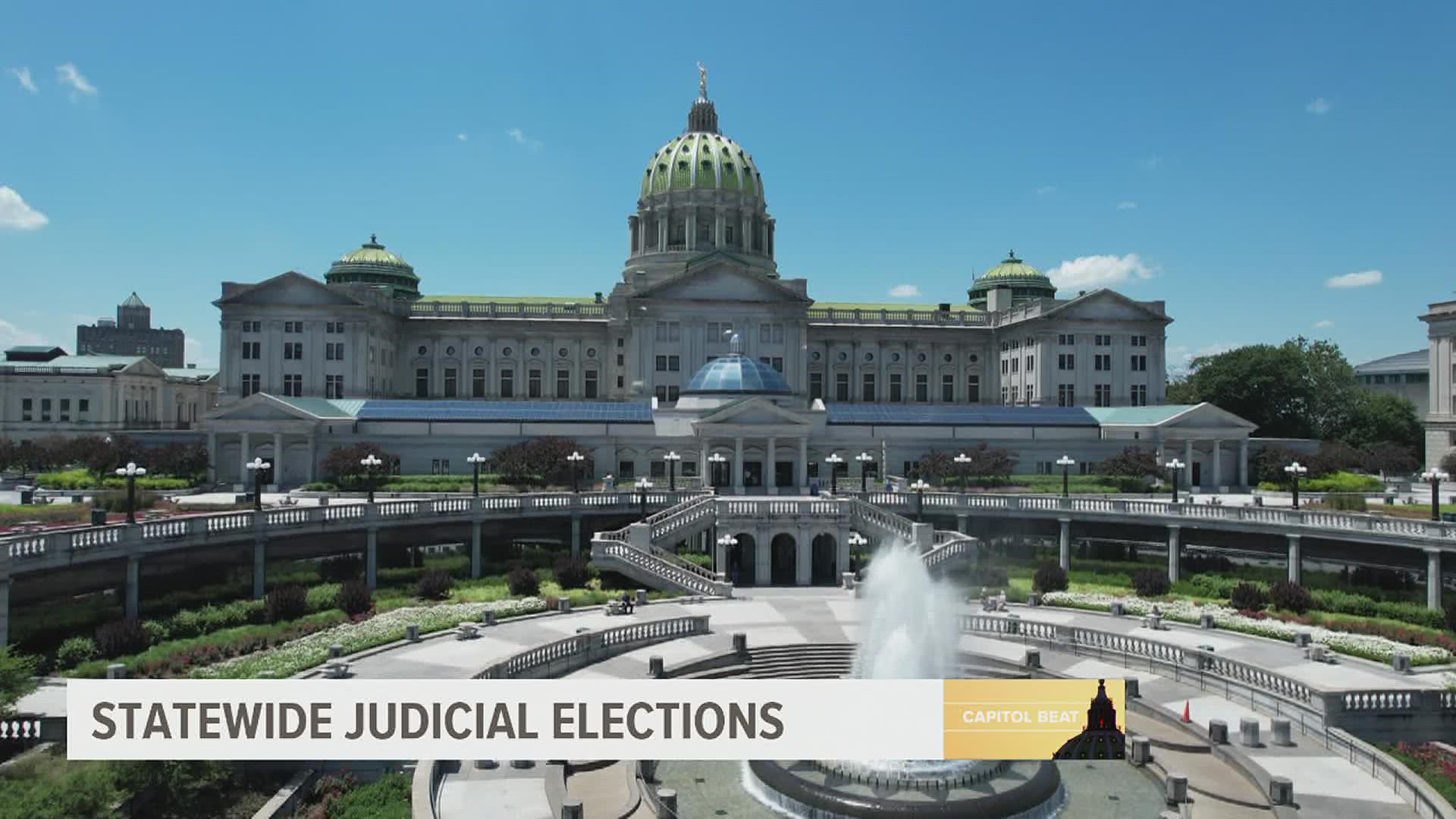HARRISBURG, Pa. — In Pennsylvania, statewide courts are decided by voters, not by political appointments.
Justices on the state Supreme Court, Superior Court, and Commonwealth Courts all serve 10-year terms, then have the choice to run again, until they turn 75 years old.
These are considered partisan elections, where judicial candidates run under their chosen political party, even though as judges, they are expected to rule from the bench in a nonpartisan way. Despite that, judicial candidates fundraise like most other candidates running for political office, and accept endorsements from political groups.
It's not common for Pennsylvania voters to participate in statewide elections in off years which don't include legislative midterm or presidential races. The 2021 General Election is different. Eligible voters will get to have a say in who sits on each of the Commonwealth's three statewide courts: Supreme, Superior, and Commonwealth.
As we've seen in recent years, the makeup of these benches have a deep impact on the fabric of Pennsylvania. Rulings on redistricting, elections, and statute of limitations on child sex abuse either have or are expected to affect citizens across the Commonwealth.
Who's running for the Pennsylvania Supreme Court?
A spot on the Pennsylvania Supreme Court is the crown jewel of judicial positions in the Commonwealth. This year, one Democrat and one Republican are trying to win a single spot on the state's highest bench.
Currently, the state's Supreme Court is made up of five Democrats and two Republicans. One of the Republican judges, former Chief Justice Thomas Saylor is retiring, as he has hit the court's 75-year-old age limit.
Recent decisions by the Pennsylvania Supreme Court, such as ruling congressional lines were gerrymandered, and upholding the constitutionality of no-excuse mail-in voting allowed by Act 77, had a direct impact on the two most recent major elections.
Republicans would not be able to win a majority on the Supreme Court until 2025, at the earliest, when a number of justices are up for retention. Because of this, legislative Republicans have pitched changing judicial elections from statewide to a more regional approach.
There is a proposed constitutional amendment to have judges, which are largely based out of Democratic strongholds in Pittsburgh and Philadelphia, instead be chosen by geographic region, similar to how Congressional candidates are chosen. The resolution has sat dormant since it passed the House Judiciary Committee in January.
The Pennsylvania Supreme Court, much like the U.S. Supreme Court, is the final stop for Commonwealth-related appeals, and like the U.S. Supreme Court, the state Supreme Court can choose whether or not they hear a case.
The two candidates going for one seat are:
- Maria McLaughlin, a Democrat who has served on the state's Superior Court since 2017. Prior to that, she was an assistant district attorney in Philadelphia.
- Kevin Brobson, a Harrisburg-based judge who has served on the Commonwealth Court since 2010, and is currently the bench's president judge.
Who's running for the Pennsylvania Superior Court?
The Pennsylvania Superior Court is sometimes considered the last line of appeals. The 15 justices and five senior judges on the appeals bench have to hear every case that comes its way.
Justices earn 10-year terms, and usually decide on cases in three-judge panels coming from county courts of common pleas.
In 2021, two judicial candidates are aiming for one spot on the Superior Court:
- The Democratic candidate is Timika Lane, a judge handling criminal cases in Philadelphia's Court of Common Pleas.
- Megan Sullivan, a Republican, who is a prosecutor in the Chester County District Attorney's office.
Justices on the Superior Court are currently split down the middle: seven Democrats, and seven Republicans.
Who's running for the Pennsylvania Commonwealth Court?
Pennsylvania's Commonwealth Court consists of nine justices and handles appeals cases brought forward by state agencies.
Like the Supreme and Superior Courts, judges are elected to 10-year terms. Appeals from the Commonwealth Court go to the Supreme Court, should they choose to take up the case.
Such was the case for a pair of cases involving the 2020 Election.
One of them involved a ruling from Judge Patricia McCullough, who ordered the vote certification be halted following a lawsuit filed by Congressman Mike Kelly and others, questioning the constitutionality of Act 77 and the no-excuse, vote-by-mail used in the General Election.
The other decision came from Judge Brobson, who ruled nearly 2,400 ballots not be counted in the race involving State Senator Jim Brewster, a Democrat, because they lacked handwritten dates.
Both decisions were eventually overturned by the state Supreme Court.
In this election, four candidates, two Democrats and two Republicans, are going for two seats on the Commonwealth Court:
- Andrew Crompton, a Republican, who was appointed to the court by Governor Tom Wolf in 2019 to fill a vacancy. Prior to landing on the bench, Crompton was a top state Senate GOP aide.
- Attorney Stacy Wallace, a Republican, who runs her own private law practice in Bradford County.
- Lori Dumas, a Democrat currently serving on the Philadelphia County Court of Common Pleas.
- David Spurgeon, a Democrat currently serving on the Allegheny County Court of Common Pleas.
Polls on Election Day, Nov. 2, will be open from 7 a.m. to 8 p.m.
Any ballots delivered by mail must be returned by 8 p.m. on Election Day.
Officials with the Pennsylvania Department of State suggest, to avoid slow mail return times and the potential of your ballot not arriving on time, to drop your ballot off in person at your county election office or in a designated ballot drop box.

